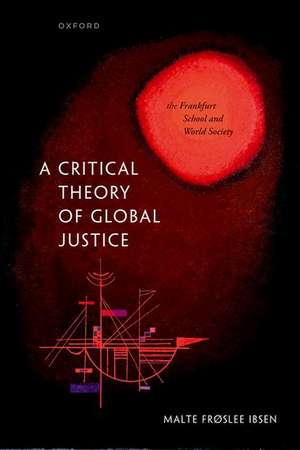A Critical Theory of Global Justice: The Frankfurt School and World Society
Autor Malte Frøslee Ibsenen Limba Engleză Hardback – 19 dec 2022
Preț: 686.22 lei
Preț vechi: 878.99 lei
-22% Nou
Puncte Express: 1029
Preț estimativ în valută:
131.32€ • 138.11$ • 109.72£
131.32€ • 138.11$ • 109.72£
Carte disponibilă
Livrare economică 09-14 decembrie
Preluare comenzi: 021 569.72.76
Specificații
ISBN-13: 9780192864123
ISBN-10: 0192864122
Pagini: 384
Dimensiuni: 163 x 240 x 26 mm
Greutate: 0.75 kg
Editura: OUP OXFORD
Colecția OUP Oxford
Locul publicării:Oxford, United Kingdom
ISBN-10: 0192864122
Pagini: 384
Dimensiuni: 163 x 240 x 26 mm
Greutate: 0.75 kg
Editura: OUP OXFORD
Colecția OUP Oxford
Locul publicării:Oxford, United Kingdom
Recenzii
A school of thought that aims at a philosophically grounded critique of existing forms of structural injustice and social irrationalities can only thrive if it constantly renews itself. Malte Frøslee Ibsen's superb reconstruction of the transformations of Critical Theory since its inception until today elegantly and succinctly discusses the challenges that has to be faced if one takes the complex realities of global structures of domination seriously. A remarkable achievement, moving the debate about transnational justice decisively forward.
Critical theory has never been more needed, and never more marginalised. In this splendid reconstruction and defence of the Frankfurt school, Malte Frøslee Ibsen evokes the anticapitalist spirit of its origins to explain how its historical analysis, sociological sensitivity and normative insight can help us address the challenges of global society. An essential reading to both reflect on the injustices of the world as a whole and - in Adornian spirit - redeem it.
In this excellent book, Ibsen offers a critical reconstruction of the Frankfurt School tradition that is alert to its Eurocentric blindspots and aims to articulate the theoretical basis of a critical theory of global justice that is adequate to contemporary world society. Intellectually rich, philosophical acute and lucidly written, this is a work that should be read by all of those engaged with critical theory broadly conceived, whether within the Frankfurt School tradition or outside of it.
Critical theory has never been more needed, and never more marginalised. In this splendid reconstruction and defence of the Frankfurt school, Malte Frøslee Ibsen evokes the anticapitalist spirit of its origins to explain how its historical analysis, sociological sensitivity and normative insight can help us address the challenges of global society. An essential reading to both reflect on the injustices of the world as a whole and - in Adornian spirit - redeem it.
In this excellent book, Ibsen offers a critical reconstruction of the Frankfurt School tradition that is alert to its Eurocentric blindspots and aims to articulate the theoretical basis of a critical theory of global justice that is adequate to contemporary world society. Intellectually rich, philosophical acute and lucidly written, this is a work that should be read by all of those engaged with critical theory broadly conceived, whether within the Frankfurt School tradition or outside of it.
Notă biografică
Malte Frøslee Ibsen is a postdoctoral fellow at the Cluster of Excellence 'Contestations of the Liberal Script (SCRIPTS)' at Freie Universität Berlin. He is a political theorist working on critical theory, global justice, democracy and globalization, populism, climate justice, and justice in finance. He studied political theory at the University of Oxford and Goethe Universität Frankfurt, where he wrote his dissertation under the supervision of Rainer Forst and Axel Honneth, and has previously held a postdoctoral position at the University of Copenhagen.
